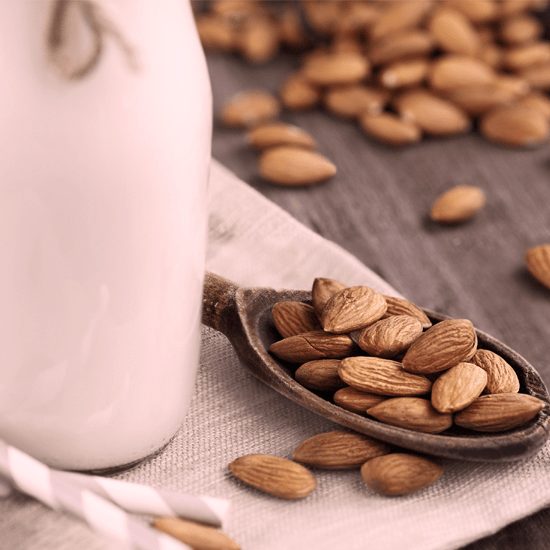
Like all mammals, human babies drink their mother’s milk. But humans are the only mammals to continue drinking milk – from other animals – for the rest of their lives. That is until recently when, with the growing popularity of veganism, the higher incidence of lactose intolerance and concern over antibiotics passed on in cow milk, plant-based milk beverages have grown in popularity.
The challenge for many of us who have only ever had “real” milk, is figuring out which milk alternative is best. Here’s a rundown of what’s what:
Almond milk: One of the first milky alternatives widely available, almond milk has been around since the Middle Ages. It’s low in calories, high in vitamins and minerals, and has the highest levels of calcium among the nut family. Where it falls short is in protein – almond milk only has about one-eighth of the protein cow’s milk does – and, depending on the brand you buy, it can be quite watery.
Soy milk: It’s the least processed of all dairy-alternatives, highest in protein and low in saturated fat. The downside of soy milk? It may cause inflammation, upset your stomach or give you gas. By the way, soy milk’s reputation for increasing estrogen in men is not backed up by science.
Cashew milk: This milk provides a good source of fiber, antioxidants, copper and magnesium. It’s also pretty low in protein, so you’ll want to make sure you get needed protein from other sources. Its thick texture may take some getting used to.
Hemp milk: While it is made from cannabis, don’t expect to get high from it – hemp milk is made from the plant’s seeds, not its leaves. Hemp milk is nutty tasting, rich in omega-3 fatty acids and a good source of protein. Unlike soy milk, it doesn’t contain the sugars that can cause gas. Any cons? It’s low in calcium so you’ll want to supplement your diet to keep your bones healthy – and it can be more expensive than other milk alternatives.
Coconut milk: Naturally sweet, this milk is high in healthy fat, vitamins and potassium. Stick with coconut milk sold in cartons, the varieties sold in cans tend to be high in calories, often from high amounts of saturated fats.
Oat milk: A relatively new kid of the block, oat milk tends to be cheaper than many nut milks and it may be more environmentally friendly. It has a creamier texture than many nut milks too and it’s a good choice for people who are lactose-intolerant, gluten-intolerant or allergic to nuts. It’s also high in fiber, high in carbohydrates and, while it has less protein than cow’s milk, it’s has more than milk from almonds, cashews and coconuts.
Which tastes the best? Our vote goes to oat milk but you should test them out for yourself.
What’s your favorite? Share your experiences with the Shop Talk blog forum now!

Did you know: Royal beverage
In ancient Egypt, milk and other dairy products like cheese were reserved for royalty, priests and the very wealthy. (Source)

I am glad that I know about the different kinds of milk.
Regular milk is best. Almond milk not good.
Real Milk is non-homogenized, at the least, and whether pasteurized, that would be a case by case determination as to what’s best. But, for fresh milk consumption, generally raw is best, as long as the microbiology is safe enough for a given output. Case by case basis. Healthy raised cows being a priority.
Quality cheese is great food for me.
My body has revealed this all very well to me,…. and I’ve been through and through the vegan/vegetarian/raw/fruitarian/omnivore/prudent eating/body integrity….. experiences and consideration since 1984. Remember, your body reveals, and much better than any of the ‘conflicting science’ matters on diet which are in abundance. Prudent omnivorism for the win. Maintain body integrity,.. understand how to manage your diet for optimum body integrity and health based on your body’s indications.
We do not drink Hemp milk, as it is low in protein and we can’t easily substitute any benefits it could have given us through supplements.
We also do not drink soy as it actually prevents nutrient absorption, which is why it is recommended to obese patients to lose weight. Also, if people in Asian cultures don’t recommend it as many have organ cancer from to much soy, that is enough evidence to avoid pain for me. But if you have no other choice I’m sorry and I hope you greatly supplement to offset any side effects.
We frequently drink Almond milk with most everything, and generally prefer Cashew milk (with or without chocolate; dairy free) by itself or in smoothies.
Coconut milk is generally reserved for cooking in our home as they strong taste of the coconut isn’t preferred all the time.
As for Oat Milk, I actually haven’t tried it and while it is high in Carbohydrates I wonder how it would be for cooking and I will definitely consider it.
I have lactose intolerance. So, I have tried soy milk and almond milk. I currently drink vanilla almond milk. It has a slight almond taste and is very delicious. I want to try other kinds of milk alternatives also.
My favorite is Almond milk but I was not aware of Oat milk until now. I am interested in trying it.
I haven’t tried any of these alternative milks yet, but I am anxious to try them. Which ones would you suggest I try first?
I prefer to drink 100% raw organic grass fed cows milk
do not drink milk, use non fat dry milk for cooking when necessary.
I drink milk and it`s good with what I eat even by it`s self . Coconut milk is ok a little watery
I have been drinking soy now for a long time but I am eager to try the new nut drinks.
I LOVE LOVE LOVE Soymilk!!! Unfortumately maybe the only other alternative I can try is the Hemp and I’ve already had Ripple, a plant-based milk. Yes, I am allergic to tree nuts, so I can’t touch Almond & Cashew milk. But I’m also sad to say Oat milk is probably a no, as I am allergoc to oats as well.. Only rolled oats are my thing? I’ve been able to eat cranberry oatmeal cookies.
I have choice the Coconut milk. I love the taste and sweetness of it.
It gets confusing. Just when you think you’v chosen the right kind of milk, you read or hear that it’s not good for you.
I enjoyed getting information on different milks that are out
Cow milk cause respiratory problems. Non dairy milk is more healthier than cow milk.
Like oat milk the best. About a year ago it became available at our store. Almond milk is too runny and expensive. We didn’t like coconut milk .
I like chocolate oat milk the best.I know this very well from Germany where you can buy it pretty cheap in grocery stores.
I haven’t had cows milk in 20 years. Got sick on it when I was pregnant with my daughter. Soy is my go-to.
She is actually the reason I became a vegetarian. I also got sick on a chicken sandwich- so no heat for 20 years either.
Being lactose intolerant, I’ve tried all of the milks listed except oat, hemp and cashew. I’m more partial to the almond milk. Since I don’t add sugar to my morning cereals, the sweetness of almond milk really enhances my breakfast. I like the flavor of vanilla or I will purchase the plain and add a spoonful of vanilla. I found the soy milk had an offensive taste to me and caused a lot of gas. I didn’t like the coconut milk at all. I don’t like coconut in any form, so it may be a mind thing as others say they can’t taste the coconut.